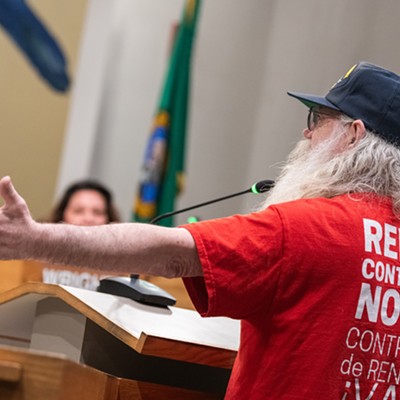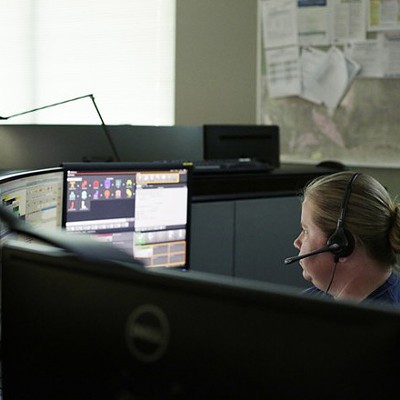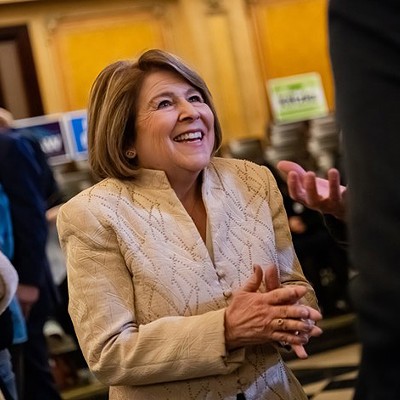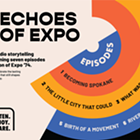Road Bond - Yes
[
{
"name": "Broadstreet - Instory",
"component": "25846487",
"insertPoint": "4",
"requiredCountToDisplay": "4"
},{
"name": "Broadstreet - Empower Local",
"component": "27852456",
"insertPoint": "8",
"requiredCountToDisplay": "8"
},{
"name": "Broadstreet - Instory",
"component": "25846487",
"insertPoint": "12",
"requiredCountToDisplay": "12"
},{
"name": "Broadstreet - Instory - 728x90 / 970x250",
"component": "27852677",
"insertPoint": "18",
"requiredCountToDisplay": "18"
},{
"name": "Broadstreet - Instory",
"component": "25846487",
"insertPoint": "5th",
"startingPoint": "23",
"requiredCountToDisplay": "24",
"maxInsertions": 100
}
]
by Robert Herold
With Avista rate hikes coming (again) and the national economic outlook uncertain, it's not a great time to be asking Spokane citizens for money. But the situation with the city's roads is dire, and without an infusion of cash, Spokane will start looking and feeling more like Mexico City than an All-American city.
Our crumbling roads are an outward sign of inner malaise. The city is strapped financially, meth labs are as ubiquitous here as Starbucks is in Seattle and a parking garage, of all things, threatens to consume the city's attention and resources for years to come. It's a sad state of affairs.
But it's also an important turning point in the city's history. Human health can be modified by behavior, and so can a city's; if the citizens simply give up, like a cancer patient with no will to live, we'll be inviting a strong dose of the Third World right here. Roads are the city's foundation, and to let them continue to slip would be to allow ourselves to slip deeper into poverty's grasp.
It's easy to blame the city for screwing up. After all, how did we ever get so deep in the hole? Funding a transportation department that could get so far behind may be akin to giving money to a drunk. But there are signs of change, and we have to trust that the new administration will deliver on its promises of renewed accountability. To vote this plan down because we don't trust city government is like cutting off your nose to spite your face.
And the problem is not entirely of the city's making. It's almost a crime that during the economic good times of the past decade, the state and federal governments didn't fund transportation better. And those priorities espoused by many wanting "smaller" government leave a bitter taste when we see what the real cost has been. Looking ahead is no better. State legislators have fumbled the transportation issue for five years. They may pass a plan -- we can only hope for its success -- in which new gas tax money could trickle down to the city. At the federal level, we will soon be spending more on defense than on anything else, even though the Pentagon can only account for three-quarters of the money it is given. Meanwhile, the federal transportation budget is being cut back.
The point is, there is nobody coming to rescue us. These are our streets, and if we want to take care of them, we need to do something ourselves, and soon. A property tax only on city residents is about the worst possible way to pay for this, but it's also the only legal option available to the city. The fact that city residents have to fund their own streets and the county's, while county residents only fund the county's (except for their share of the gas tax) underlines once again how counterproductive our local system of government has become. The city, poorer than the county, has to fix the streets that everyone uses. Well, to use that well-worn parenting phrase, "Life isn't fair."
If this bond proposal fails (or even if it manages to just squeak by), it will prove that more work needs to be done by city officials to earn the citizens' trust. This will need to be a serious exercise without the kinds of excuses that characterize past attempts at reform. Spokane has a lot of sacred cows, and some of them might just need to get ground to hamburger. Here are a few places they could start:
n Attack the issue of city-county competition. The mayor is starting this dialogue, but much more needs to be done to get at some serious cost-saving measures. Here's a sacred cow for you: Why do we need both a city and county police force?
n Undertake a top-to-bottom review of city departments. When San Diego undertook a similar effort nearly a decade ago, it tapped some of its brightest retired executives to head the effort. With solutions from privatization (Sacred Cow Alert: Civil Service) to other innovative service delivery methods, the effort to date has saved the city nearly $150 million.
n Solve River Park Square. If this takes some of Betsy Cowles' closest friends intervening, begging her to bail out the city in its time of need, so be it. Everyone who can make an impact on this issue needs to look at it through the lens of what's going to allow the city to move on. The costs of this controversy are incalculable. The money is just the beginning: It saps the city's strength at a time it needs every ounce for other challenges.
n Pressure our legislative delegation and educate the public. Note that we didn't recommend mere lobbying; we need to let Olympia and Washington, D.C., know in no uncertain terms that it's not okay to abandon us. Washington state is hampered by yet another sacred cow -- having a hodge-podge of sales taxes and other fees instead of the more fair income tax. Like the local B & amp;O tax, any politician who brings up a state income tax is practically excommunicated. That mindset comes from the public's knee-jerk brand of politics, which has enabled so many initiatives to set us back to where we are today. People need to stop thinking about how they got out of paying $100 for license tabs and think of how the guy with the new Navigator got out of paying $1,200 to help fix streets. We don't seem to see how things work beyond the ends of our noses, and aside from being a sad comment on our current place in the continuum of human enlightenment, it's clearly dangerous to public policy-making.
So aggressively seeking out new funding options and taking the message to the people will be the only way to win this war on urban decay, of which the street bond issue is but one battle. But to win this skirmish, we must vote yes.
The election is Tuesday, March 12.
With Avista rate hikes coming (again) and the national economic outlook uncertain, it's not a great time to be asking Spokane citizens for money. But the situation with the city's roads is dire, and without an infusion of cash, Spokane will start looking and feeling more like Mexico City than an All-American city.
Our crumbling roads are an outward sign of inner malaise. The city is strapped financially, meth labs are as ubiquitous here as Starbucks is in Seattle and a parking garage, of all things, threatens to consume the city's attention and resources for years to come. It's a sad state of affairs.
But it's also an important turning point in the city's history. Human health can be modified by behavior, and so can a city's; if the citizens simply give up, like a cancer patient with no will to live, we'll be inviting a strong dose of the Third World right here. Roads are the city's foundation, and to let them continue to slip would be to allow ourselves to slip deeper into poverty's grasp.
It's easy to blame the city for screwing up. After all, how did we ever get so deep in the hole? Funding a transportation department that could get so far behind may be akin to giving money to a drunk. But there are signs of change, and we have to trust that the new administration will deliver on its promises of renewed accountability. To vote this plan down because we don't trust city government is like cutting off your nose to spite your face.
And the problem is not entirely of the city's making. It's almost a crime that during the economic good times of the past decade, the state and federal governments didn't fund transportation better. And those priorities espoused by many wanting "smaller" government leave a bitter taste when we see what the real cost has been. Looking ahead is no better. State legislators have fumbled the transportation issue for five years. They may pass a plan -- we can only hope for its success -- in which new gas tax money could trickle down to the city. At the federal level, we will soon be spending more on defense than on anything else, even though the Pentagon can only account for three-quarters of the money it is given. Meanwhile, the federal transportation budget is being cut back.
The point is, there is nobody coming to rescue us. These are our streets, and if we want to take care of them, we need to do something ourselves, and soon. A property tax only on city residents is about the worst possible way to pay for this, but it's also the only legal option available to the city. The fact that city residents have to fund their own streets and the county's, while county residents only fund the county's (except for their share of the gas tax) underlines once again how counterproductive our local system of government has become. The city, poorer than the county, has to fix the streets that everyone uses. Well, to use that well-worn parenting phrase, "Life isn't fair."
If this bond proposal fails (or even if it manages to just squeak by), it will prove that more work needs to be done by city officials to earn the citizens' trust. This will need to be a serious exercise without the kinds of excuses that characterize past attempts at reform. Spokane has a lot of sacred cows, and some of them might just need to get ground to hamburger. Here are a few places they could start:
n Attack the issue of city-county competition. The mayor is starting this dialogue, but much more needs to be done to get at some serious cost-saving measures. Here's a sacred cow for you: Why do we need both a city and county police force?
n Undertake a top-to-bottom review of city departments. When San Diego undertook a similar effort nearly a decade ago, it tapped some of its brightest retired executives to head the effort. With solutions from privatization (Sacred Cow Alert: Civil Service) to other innovative service delivery methods, the effort to date has saved the city nearly $150 million.
n Solve River Park Square. If this takes some of Betsy Cowles' closest friends intervening, begging her to bail out the city in its time of need, so be it. Everyone who can make an impact on this issue needs to look at it through the lens of what's going to allow the city to move on. The costs of this controversy are incalculable. The money is just the beginning: It saps the city's strength at a time it needs every ounce for other challenges.
n Pressure our legislative delegation and educate the public. Note that we didn't recommend mere lobbying; we need to let Olympia and Washington, D.C., know in no uncertain terms that it's not okay to abandon us. Washington state is hampered by yet another sacred cow -- having a hodge-podge of sales taxes and other fees instead of the more fair income tax. Like the local B & amp;O tax, any politician who brings up a state income tax is practically excommunicated. That mindset comes from the public's knee-jerk brand of politics, which has enabled so many initiatives to set us back to where we are today. People need to stop thinking about how they got out of paying $100 for license tabs and think of how the guy with the new Navigator got out of paying $1,200 to help fix streets. We don't seem to see how things work beyond the ends of our noses, and aside from being a sad comment on our current place in the continuum of human enlightenment, it's clearly dangerous to public policy-making.
So aggressively seeking out new funding options and taking the message to the people will be the only way to win this war on urban decay, of which the street bond issue is but one battle. But to win this skirmish, we must vote yes.
The election is Tuesday, March 12.



















